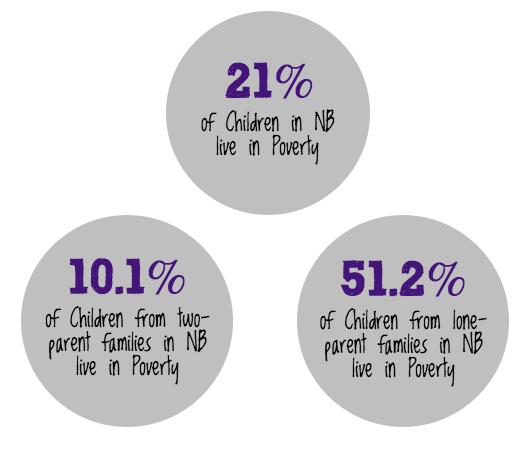
3 minute read
Inequality
The effects of inequality go beyond income and wealth; they touch every aspect of our society. Inequality is pervasive and insidious.
High levels of inequality affectI individuals and society as a whole.
Outcomes for each of the following eleven areas are significantly worse in more unequal, rich countries: physical health, mental health, drug abuse, education, imprisonment, obesity, social mobility, trust and community life, violence, teenage pregnancies, and child well-being.
The UNICEF index of child well-being is related to inequality in rich countries; as inequality goes up, child well-being goes down.
Child Well-Being
Inequality
(Source: The Spirit Level: Why Equality is Better for Everyone by Kate Pickett & Richard Wilkinson)

We need to address the numerous barriers that continue to prevent lone-parent families from getting ahead. These include: • inadequate parental leave, • unaffordable child-care, • policies that are not family friendly, • and a lack of support for new parents.
In New Brunswick, children from lone-parent families are five times as likely to live in poverty as children from two-parent families. This is unacceptable; children should not be deprived of their fundamental rights because of family composition.
Child Care in New Brunswick
The cost of child care is a major burden for families, and licensed spots are limited. The report They Go Up So Fast: 2015 Child Care Fees in Canadian Cities notes that “New Brunswick has the most mathematically complex formula for families with incomes over $30,000.” Some childcare centres do not accept children on a subsidy, and others charge parents an additional fee above what is covered. In New Brunswick, families are required to cover the difference when the subsidy does not cover the cost of child care (in some provinces, the family pays a set amount, and the province covers the difference). The province contributes a maximum subsidy amount of $24.25 per day for a child over two in full-time care, with parents picking up whatever part of the market rate this amount does not cover. As market prices go up, so does the cost to New Brunswick parents. The report further explains:
“Families in New Brunswick may be eligible to receive a subsidy for un-licensed “alternative child care” if no licensed care is available… The subsidy rates for alternative care are lower than for licensed care… To be eligible for a subsidy, alternative care cannot be provided by a member of the child’s immediate family.”
According to the Province of New Brunswick’s Child Day Care Services Annual Statistical Report 2014-2015, there are 25,557 licensed spaces in New Brunswick. Of those, 1,970 spaces are for infants, and 10,707 spaces are for pre-school aged children.
As stated in the previous section, poverty goes beyond basic needs; poverty is also lacking the means to integrate into and participate in society and your community. For children, poverty and inequality can put sports and other extra curricular activities out of reach. According)to)a)survey)by)Hockey)Canada,)the)average)hockey)parent)spent)just)shy)of)$3,000)on) minor)hockey)in)the)2011@12)season.)According)to)the)survey)conducted)in)the)fall)of)2015,)“43%) of)parents)say)they)or)someone)they)know)are)borrowing)money)to)put)a)child)in)extracurricular) acIviIes”)and)“more)parents)than)ever)(46%))say)either)they)or)someone)they)know)is)pulling) kids)out)of)hockey)and)other)acIviIes)because)of)the)cost”.
The negative consequences of this are farreaching. For example, post-secondary education institutions, as well as companies hiring new employees, are looking for well rounded applicants who have participated in extracurricular activities and volunteered. Those who were unable to participate in extracurricular activities because of financial need, may find that scholarships and other opportunities are out of reach.
"Canada's Wealthy 86 represent only 0.002% of the population but they're so flush they could buy absolutely everything owned by every person in New Brunswick. They could buy up all of New Brunswickers' cars, all of their houses, all of their undeveloped land, all of their stocks, bonds, pension funds and RRSPs, all of their jewelry, all of their furniture—everything—and still have billions to spare.”
—David Macdonald, Senior Economist with the Canadian Centre for Policy Alternatives
Our system is set up to reward those who have already had a head start. We need to build a more equitable system.




